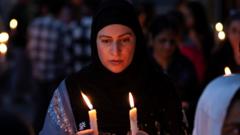Residents in Indian-administered Kashmir are grappling with heightened fears and hostility after a tragic attack last week that left 26 people dead at a popular tourist site in the region. Many in Kashmir feel their identity is now seen as a liability rather than a cultural asset.
For more than 20 years, Shabir Ahmad Dar has sold exquisite pashmina shawls in Mussoorie, Uttarakhand—a bustling hill town known for its tourism. His wares represent not only his livelihood but also the rich history of Kashmir. However, following the attack, his identity as a Kashmiri has led to violent repercussions. Recently, Dar and another vendor were assaulted by members of a right-wing group who blamed them for the Pahalgam incident, demanding they leave and never return.
"I felt like I was being chased from my homeland," stated Dar, whose goods worth thousands remain abandoned due to the fear instilled in him by the assault. As news of the attack spread, police arrested the assailants only to release them shortly after, prompting many Kashmiri vendors in the area to flee back home for safety.
Reports of harassment against Kashmiri students and vendors have surged since the killings. Ummat Shabir, a nursing student, recounted being labeled a "terrorist" and expelled from public transport simply due to her heritage. Though she has returned to Kashmir, the sense of security is ephemeral, as rising tensions and violence are commonplace in the region.
Efforts by security forces to detain suspects connected to the Pahalgam attack have led to an unsettling crackdown in Kashmir, where thousands have been arrested, and homes associated with suspected militants have been demolished. Critics, including former local leaders, have likened these measures to collective punishment, urging authorities to differentiate between culpable militants and innocent civilians.
Many Kashmiris, historically accustomed to turbulence, feel particularly vulnerable in this atmosphere of blame and aggression. Shafi Subhan, a longtime shawl seller, expressed his dismay over the public's indifference during the recent attack, stating, "No one came to help."
The ongoing conflict over Kashmir between India and Pakistan complicates the situation further, making its residents feel like pawns in a larger geopolitical struggle. Although violence had diminished in recent years, many Kashmiris believe the recent surge of hostility could jeopardize the fragile peace that had begun to take shape in their lives.
As candlelight vigils and protests highlight their grief in the wake of such violence, Kashmiris navigate a precarious existence, perpetually tasked with proving their innocence amidst the fog of suspicion cast upon them.
For individuals like Mohammad Shafi Dar, a daily wage worker whose home was demolished by forces seeking retribution for the militant attack, this means grappling with profound loss and uncertainty. "We lost everything," he lamented, symbolizing an all-too-common plight among his people.





















